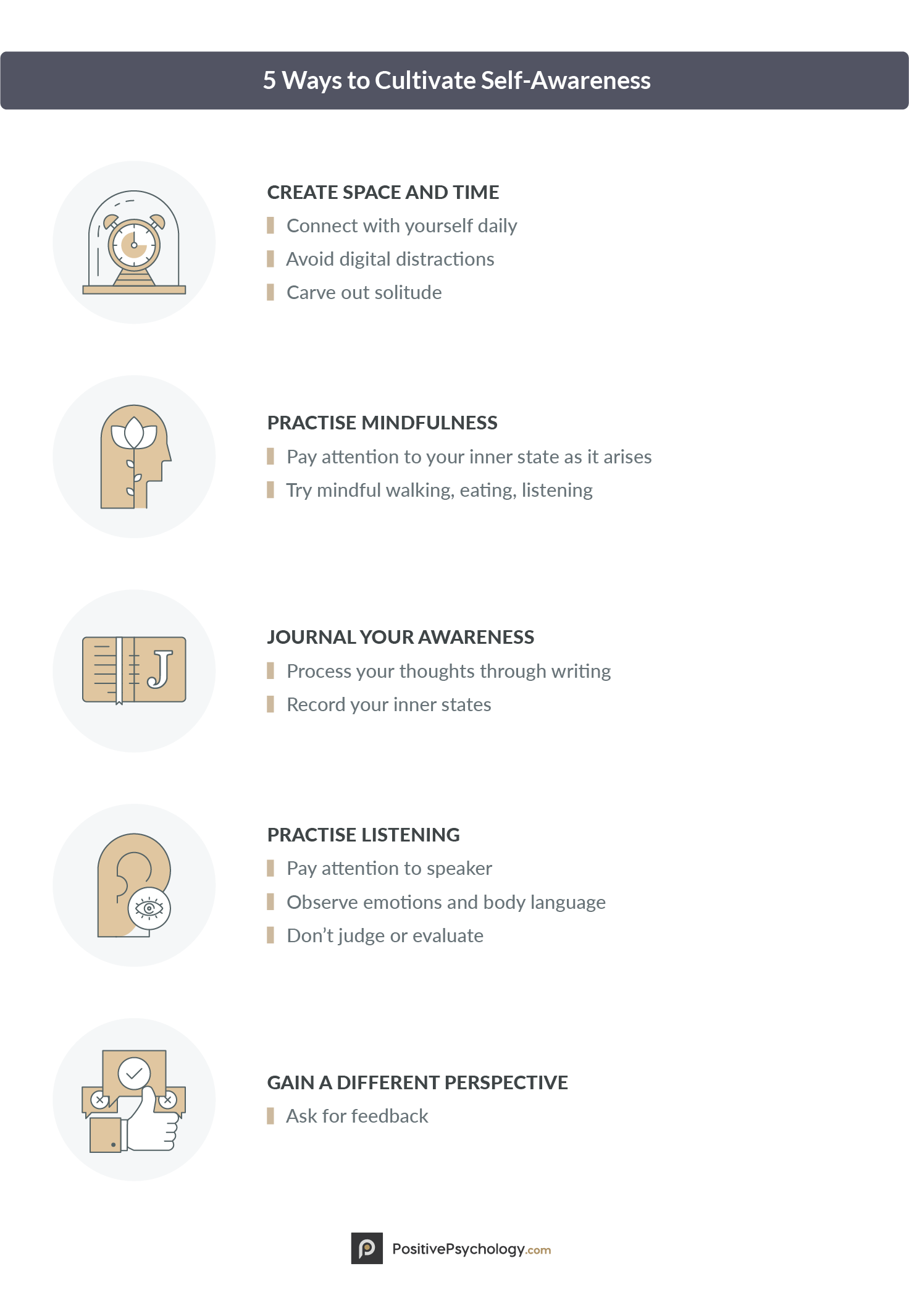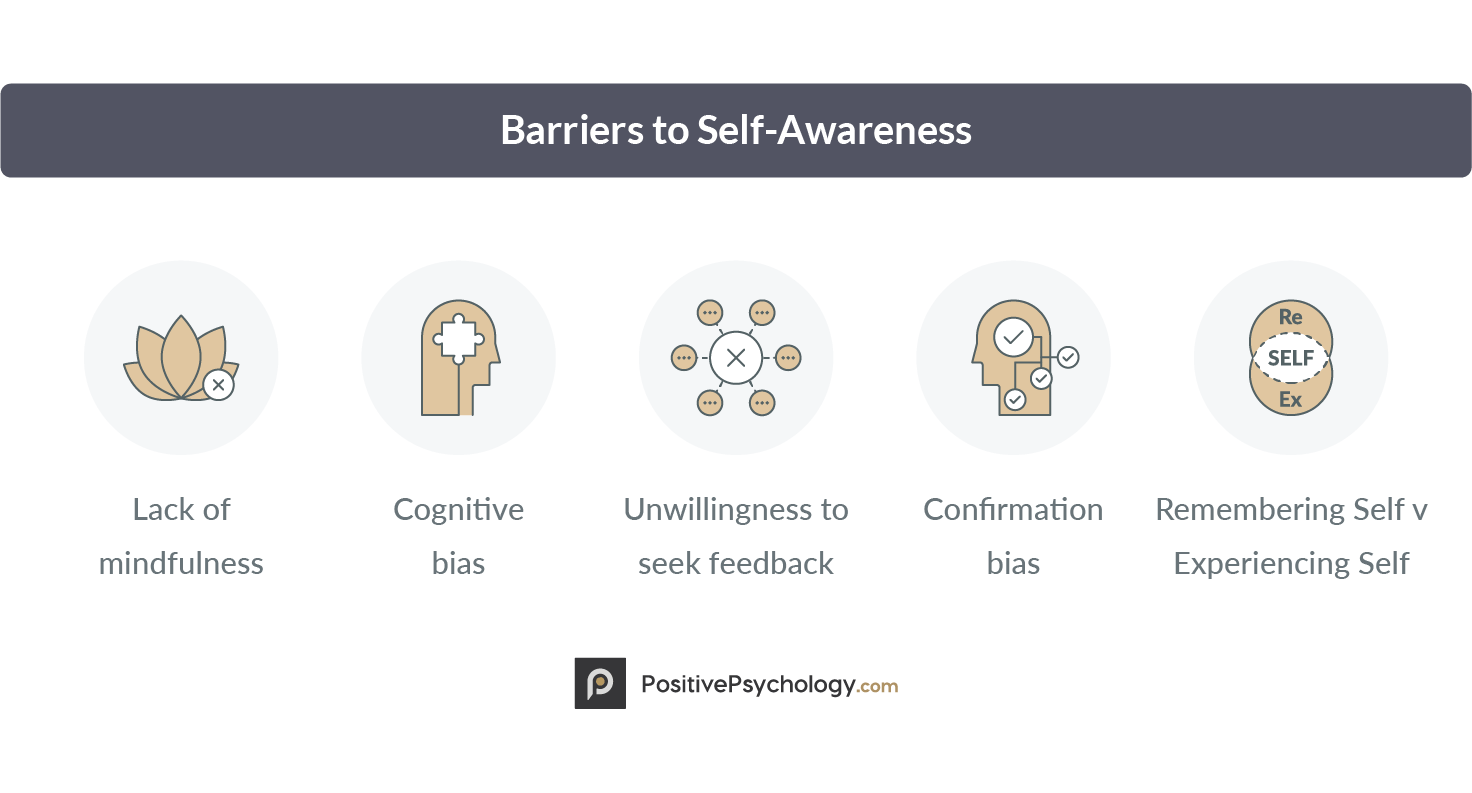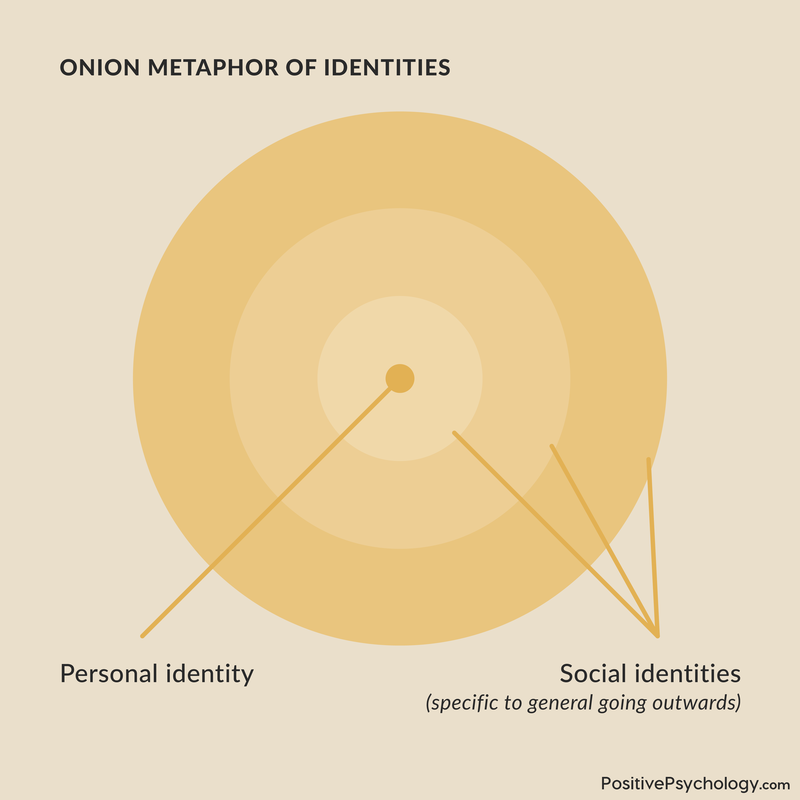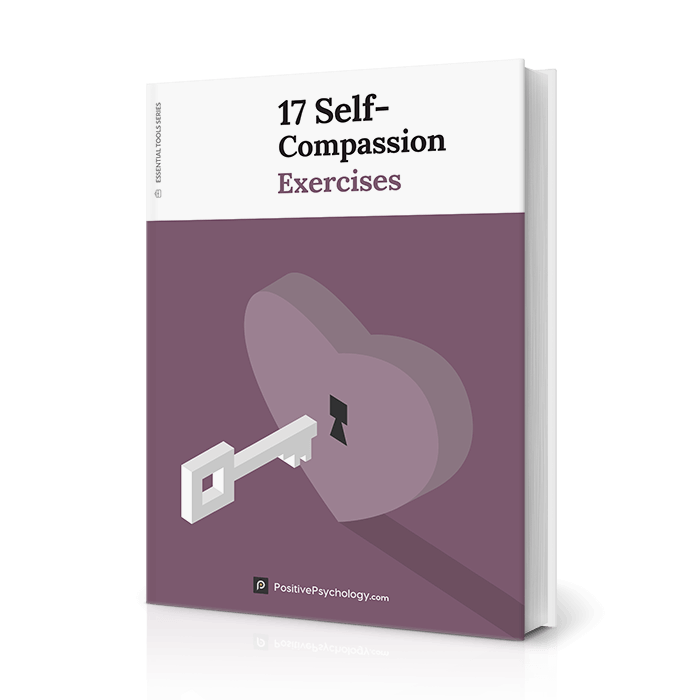What Is Self-Awareness? (+5 Ways to Be More Self-Aware)
 Self-awareness is the ability to see yourself clearly and objectively through reflection and introspection.
Self-awareness is the ability to see yourself clearly and objectively through reflection and introspection.
While it may not be possible to attain total objectivity about oneself (that’s a debate that has continued to rage throughout the history of philosophy), there are certainly degrees of self-awareness. It exists on a spectrum.
Although everyone has a fundamental idea of what self-awareness is, we don’t know exactly where it comes from, what its precursors are, or why some of us seem to have more or less than others.
This is where the self-awareness theory comes in, offering some potential answers to questions like these.
Before you continue, we thought you might like to download our three Self-Compassion Exercises for free. These detailed, science-based exercises will not only help you increase the compassion and kindness you show yourself but will also give you the tools to help your clients, students, or employees show more compassion to themselves.
This Article Contains:
- What Is Self-Awareness Theory?
- Research on the Topic
- 4 Proven Benefits of Self-Awareness
- 3 Examples of Self-Awareness Skills
- 5 Ways to Increase Your Self-Awareness
- Importance in Counseling and Coaching
- Meditation, Mindfulness, and Self-Awareness
- Self-Awareness & Emotional Intelligence
- 4 Tips for Improving Self-Awareness in Relationships
- Role in the Workplace and Leadership
- Self-Awareness in Students and Children
- A Take-Home Message
- References
What Is Self-Awareness Theory?
Self-awareness theory is based on the idea that you are not your thoughts, but the entity observing your thoughts; you are the thinker, separate and apart from your thoughts (Duval & Wicklund, 1972).
We can go about our day without giving our inner self any extra thought, merely thinking and feeling and acting as we will; however, we also can focus our attention on that inner self, an ability that Duval and Wicklund (1972) termed “self-evaluation.”
When we engage in self-evaluation, we can give some thought to whether we are thinking and feeling and acting as we “should” or following our standards and values. This is referred to as comparing against our standards of correctness. We do this daily, using these standards as a way to judge the rightness of our thoughts and behaviors.
Using these standards is a major component of practicing self-control, as we evaluate and determine whether we are making the right choices to achieve our goals.
Research on the Topic
This theory has been around for several decades, giving researchers plenty of time to test its soundness. The depth of knowledge on self-awareness, its correlates, and its benefits can provide us with a healthy foundation for enhancing self-awareness in ourselves and others.
According to the theory, there are two primary outcomes of comparing ourselves against our standards of correctness:
- We “pass,” or find alignment between ourselves and our standards.
- We “fail,” or find a discrepancy between ourselves and our standards (Silvia & Duval, 2001).
When we find a discrepancy between the two, we find ourselves with two choices: to work toward reducing the discrepancy or avoid it entirely.
Self-awareness theory (and subsequent research) suggests that there are a couple of different factors that influence how we choose to respond. Basically, it comes down to how we think it will turn out. If we believe there’s little chance of actually changing this discrepancy, we tend to avoid it. If we believe it’s likely that we can improve our alignment with our standards of correctness, we take action.
Our actions will also depend on how much time and effort we believe that realignment will take; the slower progress will be, the less likely we are to take on the realignment efforts, especially if the perceived discrepancy between ourselves and our standards is large (Silvia & Duval, 2001).
Essentially, this means that when faced with a significant discrepancy that will take a lot of consistent and focused work, we often simply don’t bother and stick to avoiding self-evaluation on this particular discrepancy.
Further, our level of self-awareness interacts with the likelihood of success in realigning ourselves and our standards to determine how we think about the outcome. When we are self-aware and believe there is a high chance of success, we are generally quick to attribute that success or failure to our efforts.
Conversely, when we are self-aware but believe there is a low chance of success, we tend to think that the outcome is more influenced by external factors than our efforts (Silvia & Duval, 2001). Of course, sometimes our success in realignment with our standards is driven in part by external factors, but we always have a role to play in our successes and failures.
Interestingly, we also have some control over our standards, such that we may alter our standards if we find that we don’t measure up to them (Dana, Lalwani, & Duval, 1997).
This is more likely to happen if we’re focused more on the standards than on ourselves; if we fail when we are focused on the standards more than our performance, we are more likely to blame the standards and alter them to fit our performance (Dana et al., 1997).
Although it may sound like merely shifting the blame to standards and, therefore, letting yourself off the hook for a real discrepancy, there are many situations in which the standards are overly strict. Therapists’ offices are filled with people who hold themselves to impossibly high standards, effectively giving themselves no chance of success when comparing themselves to their internal standards.
It’s clear from the research on self-awareness that it is an important factor in how we think, feel, act, and react to our thoughts, feelings, and actions.
Self Awareness – TalentSprout
4 Proven Benefits of Self-Awareness
Now, let’s shift our attention to research on the outcomes of being self-aware.
As you might imagine, there are many benefits to practicing self-awareness:
- It can make us more proactive, boost our acceptance, and encourage positive self-development (Sutton, 2016).
- Self-awareness allows us to see things from the perspective of others, practice self-control, work creatively and productively, and experience pride in ourselves and our work as well as general self-esteem (Silvia & O’Brien, 2004).
- It leads to better decision making (Ridley, Schutz, Glanz, & Weinstein, 1992).
- It can make us better at our jobs, better communicators in the workplace, and enhance our self-confidence and job-related wellbeing (Sutton, Williams, & Allinson, 2015).
These benefits are reason enough to work on improving self-awareness, but this list is by no means exhaustive. Self-awareness has the potential to enhance virtually every experience you have, as it’s a tool and a practice that can be used anywhere, anytime, to ground yourself in the moment, realistically evaluate yourself and the situation, and help you make good choices.
3 Examples of Self-Awareness Skills
So we know that self-awareness is good, but what does it look like? How does one practice self-awareness?
Below are three examples of someone practicing self-awareness skills:
Bob at work
Bob struggles with creating a quarterly report at work, and he frequently produces subpar results. He notices the discrepancy between his standards and performance and engages in self-evaluation to determine where it comes from and how to improve.
He asks himself what makes the task so hard for him, and he realizes that he never seems to have trouble doing the work that goes into the report, but rather, writing it up cohesively and clearly.
Bob decides to fix the discrepancy by taking a course to improve his writing ability, having a colleague review his report before submitting it, and creating a reusable template for future reports so he is sure to include all relevant information.
Monique at home
Monique is having relationship problems with her boyfriend, Luis. She thinks Luis takes her for granted and doesn’t tell her he loves her or share affection enough. They fight about this frequently.
Suddenly, she realizes that she may be contributing to the problem. She looks inward and sees that she doesn’t show Luis appreciation very often, overlooking the nice things he does around the house for her and little physical touches that show his affection.
Monique considers her thought processes when Luis misses an opportunity to make her feel loved and notes that she assumes he purposely avoids doing things that she likes. She spends time thinking and talking with Luis about how they want to show and receive love, and they begin to work on improving their relationship.
Bridget on her own
Bridget struggles with low self-esteem, which causes depressive symptoms. She doesn’t feel good enough, and she doesn’t accept opportunities that come her way because of it. She begins working with a therapist to help her build self-awareness.
The next time an opportunity comes her way, she thinks she doesn’t want to do it and initially decides to turn it down. Later, with the help of some self-awareness techniques, Bridget realizes that she is only telling herself she doesn’t want to do it because of her fear that she won’t be good enough.
Bridget reminds herself that she is good enough and redirects her thoughts to “what if I succeed?” instead of “what if I fail?” She accepts the opportunity and continues to use self-awareness and self-love to improve her chances of success.
These three stories exemplify what self-awareness can look like and what it can do for you when you tap into it. Without self-awareness, Bob would have kept turning in bad reports, Monique would have continued in an unsatisfying relationship or broken things off, and Bridget would never have taken the opportunity that helped her grow.
If you look for them, you can find these stories everywhere.
5 Ways to Increase Your Self-Awareness
 Now we have some clearcut examples of self-awareness in mind. We know what it looks like to embrace self-awareness and grow. But how do you do it? What did our leading characters do to practice self-awareness?
Now we have some clearcut examples of self-awareness in mind. We know what it looks like to embrace self-awareness and grow. But how do you do it? What did our leading characters do to practice self-awareness?
There are many ways to build and practice self-awareness, but here are some of the most effective:
1. Practice mindfulness and meditation
Mindfulness refers to being present in the moment and paying attention to yourself and your surroundings rather than getting lost in thought or ruminating or daydreaming.
Meditation is the practice of focusing your attention on one thing, such as your breath, a mantra, or a feeling, and letting your thoughts drift by instead of holding on to them.
Both practices can help you become more aware of your internal state and your reactions to things. They can also help you identify your thoughts and feelings and keep from getting so caught up in them that you lose your hold on your “self.”
2. Practice yoga
Yoga is a physical practice, but it’s just as much a mental practice. While your body is stretching and bending and flexing, your mind is learning discipline, self-acceptance, and awareness. You become more aware of your body and all the feelings that manifest, and you become more aware of your mind and the thoughts that crop up.
You can even pair yoga with mindfulness or meditation to boost your self-awareness.
3. Make time to reflect
Reflecting can be done in multiple ways (including journaling; see the next tip) and is customizable to the person reflecting, but the important thing is to go over your thoughts, feelings, and behaviors to see where you met your standards, where you failed them, and where you could improve.
You can also reflect on your standards themselves to see if they are good ones for you to hold yourself to. You can try writing in a journal, talking out loud, or simply sitting quietly and thinking, whatever helps you to reflect on yourself.
4. Journal
The benefit of journaling is that it allows you to identify, clarify, and accept your thoughts and feelings. It helps you discover what you want, what you value, and what works for you. It can also help you find out what you don’t want, what is not important to you, and what doesn’t work for you.
Both are equally important to learn. Whether you like to write free-flowing entries, bulleted lists, or poems, writing down your thoughts and feelings helps you to become more aware and intentional.
5. Ask the people you love
It’s vital to feel we know ourselves from the inside, but external feedback helps too. Ask your family and close friends about what they think about you. Have them describe you and see what rings true with you and what surprises you.
Carefully consider what they say and think about it when you journal or otherwise reflect. Of course, don’t take any one person’s word as gospel; you need to talk to a variety of people to get a comprehensive view of yourself.
And remember that at the end of the day, it’s your self-beliefs and feelings that matter the most to you!
Importance in Counseling and Coaching
Self-awareness is a powerful tool that, when practiced regularly, can do more good for coachees and clients than anything else a professional can share with them. To make real, impactful, and lasting change, people need to be able to look inward and become familiar with that internal environment.
Building self-awareness should be a top priority for virtually all clients, after which the more traditional coaching and counseling work can begin. For example, you can counsel someone on their bad habits and give 1,000 ways to break their habits.
Still, if they don’t understand why they tend toward these bad habits in the first place, it’s almost a guarantee that they will either never break those habits or will quit for a while and simply pick up where they left off when things get tough.
Self-awareness is not only vital for the coachee or client; it is also important for the coach or counselor. In fact, self-awareness is prioritized as a core standard in the Council for Accreditation of Counseling and Related Educational Programs Standards (2017) for the profession, as both a requirement for counselors and a necessary skill to build in clients.
It takes a good amount of self-awareness to give competent counsel and provide actionable advice. Plus, self-awareness will help the caring counselor from getting too wrapped up in their client’s problems or seeing the issues through their own skewed lens.
To truly help someone, it’s essential to see things from their perspective, and that requires being self-aware enough to put our thoughts and feelings aside sometimes.
Meditation, Mindfulness, and Self-Awareness
The link between meditation, mindfulness, and self-awareness is clear, meaning it’s no surprise that practicing the first two will naturally lead to more of the third.
When we meditate or practice mindfulness, we are paying attention to the things that can often get ignored in our busy day-to-day: the present moment and our own internal experience. Those who get to know their thought processes and patterns are more able to adapt and improve them, both by simply being aware of their processes and patterns and by giving themselves a mechanism for practicing and improving.
Indeed, a program intended to enhance self-awareness (among other things) through yoga and meditation resulted in a range of improvements, including more positive affect, less stress, greater mindfulness, enhanced resilience, and even greater job satisfaction (Trent et al., 2019).
Self-Awareness & Emotional Intelligence
 Emotional intelligence can be defined as the cluster of abilities that allow us to recognize and regulate emotions in ourselves and others (Goleman, 2001).
Emotional intelligence can be defined as the cluster of abilities that allow us to recognize and regulate emotions in ourselves and others (Goleman, 2001).
According to the most popular theory of emotional intelligence from psychologist and author Daniel Goleman (2001), self-awareness is not only crucial for emotional intelligence; it’s one of the five components.
These five components are:
- Self-awareness
- Self-regulation
- Social skills
- Empathy
- Motivation
Other popular theories of emotional intelligence also include self-awareness as a core component, making it one of the factors that virtually all researchers and experts agree on (Goleman, 2001).
Self-awareness is a necessary building block of emotional intelligence; it is the building block upon which the rest of the components are built. One must have self-awareness to self-regulate, and social skills will be weak and of little use if you are not aware enough about when and how to use them.
If you’re looking to build your emotional intelligence, self-awareness is the first step. Make sure you have developed strong skills in self-awareness before giving the other elements your all.
Individuals do not want to be too similar or too dissimilar to others. They search for optimal distinctiveness (Brewer, 1991). Being too different and unaccepted can lead to stigmatization, prejudice, and isolation (Lynn & Snyder, 2002).
But being too similar can make you lose your sense of self. All humans have these competing needs to belong (Baumeister & Leary, 1995) yet stand out from others. People may vary in their need for uniqueness. Still, most people adjust their behaviors to set them apart when they feel too similar to others (Mengers, 2014).
In that respect, you can compare a person to an onion. Personal identities are at the core, with social identities building the different outward layers. Imagine, for example, you are traveling and asked where you are from. Answering the specific district you are from won’t relate to a person from a different continent, but telling your home country won’t differentiate you from others of the same nationality.
Other common social identities are race, ethnicity, religion, gender, sexual orientation, or age. Given the context, people can call their social identity to action, depending on their need to belong to or differ from a group (Brewer, 1991).
Individuals can fulfill their needs simultaneously by activating social identities associated with distinct groups, resulting in greater levels of wellbeing (Mengers, 2014).
Apart from benefits for personal wellbeing and life satisfaction, societies can benefit from encouraging distinctiveness (Lynn & Snyder, 2002). Open and accepting environments allow people to assert their uniqueness, engage in their interests and pursuits and fear negative consequences less (Mengers, 2014).
To know who you are and live authentically, you must also understand what you are not. Distinctiveness is an essential tool to help differentiate you from others. Openness and approval must be encouraged to enable individuals, especially teenagers, to thrive.
4 Tips for Improving Self-Awareness in Relationships
If you want to be more like post-reflection Monique than pre-reflection Monique (referring to examples of self-awareness skills in action above), or if you’re going to help your clients with their relationship woes, here are some excellent tips for introducing more self-awareness within the context of a relationship:
1. Be mindful
Practice mindfulness, especially when interacting with your loved ones. Pay attention to the words they say, their tone, their body language, and their facial expressions. We often communicate far more information with the latter three than we do with our words alone. Give your loved ones your full attention.
2. Talk
Have regular discussions about the relationship. It’s important to keep things in perspective and ensure that nothing is falling between the cracks.
When you have regular conversations about your relationship with your loved ones, it’s much harder to avoid or ignore things that can turn into problems. It also helps you reflect on your part and come prepared to discuss your thoughts, feelings, and behaviors with your loved ones.
3. Quality time
Spend quality time together and apart. This is especially important for romantic relationships, as we often find ourselves spending most or even all of our free time with our spouse or partner. However much you love and enjoy spending time with your partner, everyone needs some quality time alone.
Make sure you and your partner are both getting some quality “me” time to think about what you want, what you need, and what your goals are. This will help you keep yourself from merging too much into your partner and maintaining your independence and stability.
Then, since there will be two independent, stable, and healthy adults in the relationship, it will be even more fulfilling and satisfying to both partners when they spend quality time together.
4. Be considerate
Share your perspective and consider theirs. It’s easy to get too caught up in our own perspective on things; however, healthy relationships require that we consider others’ needs in addition to our own.
To know what our loved ones need and to deliver on those needs, we must first identify and understand them. We do this by practicing our self-awareness and sharing that awareness with our friends and family.
If you never check in with your loved ones on their views or feelings, it can cause you to drift apart and inhibit real, satisfying intimacy. Ask your loved ones for their perspective on things and share your perspective with them.
Role in the Workplace and Leadership
 As noted earlier, self-awareness improves our communication, confidence, and job performance (Sutton et al., 2015).
As noted earlier, self-awareness improves our communication, confidence, and job performance (Sutton et al., 2015).
It’s easy to see how self-awareness can lead to these outcomes in the workplace, as better self-evaluation naturally leads to improving the alignment between our actions and our standards, resulting in better performance.
According to Tasha Eurich (2018), self-awareness can be divided into two categories or types: internal self-awareness and external self-awareness.
Internal self-awareness is about how well we see ourselves and our strengths, weaknesses, values, etc., while external self-awareness is understanding how others view us with those same factors (Eurich, 2018). Good managers and leaders need both to perform well in their roles.
Although you might think that more experience as a leader and greater power in one’s role lead to better self-awareness, that may not be the case. Experience can be positive or negative in terms of learning and improving the self. Even positive experiences can lead one to attribute success to themselves when it may have had more to do with the circumstances, leading to false confidence.
In fact, only 10–15% of those in Eurich’s (2018) study displayed self-awareness, although most of us believe we are self-aware.
To improve self-awareness, Eurich (2018) recommends introspection, but with a focus on asking oneself the right questions. She notes that asking “why” might not always be effective, as many of our internal processes remain shrouded in our subconscious or unconscious minds; instead, asking “what” may lead to better introspection.
For example, instead of asking, “Why do I fail at this task so often?” you might ask yourself, “What are the circumstances in which I fail at this task, and what can I do to change them?” It’s not a foolproof method, but it can aid you in improving your self-awareness and increasing your alignment with your standards on certain activities.
Self-Awareness in Students and Children
Self-awareness isn’t just for managers and employees; it can also substantially benefit students, children, and adolescents. The same benefits that make us more productive in the workplace can make students more productive in the classroom and at home: better communication with teachers and peers, more confidence, and more satisfaction with performance can all lead to happier, healthier students.
These benefits also apply to advanced students. Increased self-awareness leads to more self-care in medical students (Saunders et al., 2007) and a better understanding of one’s strengths and capabilities along with a boost to emotional intelligence in law students (James, 2011).
A Take-Home Message
In short, a little extra self-awareness can be of great benefit to anyone with the will to improve. This piece includes a description of self-awareness, an exploration of the theory of self-awareness, examples, and tips and tools you can use to boost your self-awareness. We hope you find this information helpful in increasing your self-awareness or that of your clients.
What exercises do you use to help build self-awareness? What are some other benefits you’ve noticed? Let us know in the comments section below.
If you liked this post, head on over to our post about self-awareness books to further help you increase reflection.
We hope you enjoyed reading this article. Don’t forget to download our three Self Compassion Exercises for free.
- Baumeister, R. F., & Leary, M. R. (1995). The need to belong: Desire for interpersonal attachments as a fundamental human motivation. Psychological Bulletin, 117(3), 497–529.
- Brewer, M. B. (1991). The social self: On being the same and different at the same time. Personality and Social Psychology Bulletin, 17(5), 475-482.
- Council for Accreditation of Counseling and Related Educational Programs. (2017). 2009 Standards. Retrieved from https://www.cacrep.org/wp-content/uploads/2017/07/2009-Standards.pdf
- Dana, E. R., Lalwani, N., & Duval, S. (1997). Objective self-awareness and focus of attention following awareness of self-standard discrepancies: Changing self or changing standards of correctness. Journal of Social and Clinical Psychology, 16, 359–380.
- Duval, S., & Wicklund, R. A. (1972). A theory of objective self-awareness. Academic Press.
- Eurich, T. (2018, January 4). What self-awareness really is (and how to cultivate it). Harvard Business Review. Retrieved from https://hbr.org/2018/01/what-self-awareness-really-is-and-how-to-cultivate-it
- Goleman, D. (2001). Emotional intelligence: Issues in paradigm building. In C. Cherniss & D. Goleman (Eds.) The emotionally intelligent workplace. Jossey-Bass.
- James, C. (2011). Law student wellbeing: Benefits of promoting psychological literacy and self-awareness using mindfulness, strengths theory, and emotional intelligence. Legal Education Review, 21(2).
- Lynn, M., & Snyder, C. R. (2002). Uniqueness seeking. Handbook of Positive Psychology, 395-410.
- Mengers, A. A. (2014). The benefits of being yourself: An examination of authenticity, uniqueness, and well-being.
- Ridley, D. S., Schutz, P. A., Glanz, R. S., & Weinstein, C. E. (1992). Self-regulated learning: The interactive influence of metacognitive awareness and goal-setting. The Journal of Experimental Education, 60, 293–306.
- Saunders, P. A., Tractenberg, R. E., Chaterji, R., Amri, H., Harazduk, N., Gordon, J. S., … Haramati, A. (2007). Promoting self-awareness and reflection through an experiential mind–body skills course for first-year medical students. Medical Teacher, 29, 778–784.
- Silvia, P. J., & Duval, T. S. (2001). Objective Self-Awareness Theory: Recent progress and enduring problems. Personality and Social Psychology Review, 5, 230–241.
- Silvia, P. J., & O’Brien, M. E. (2004). Self-awareness and constructive functioning: Revisiting “the Human Dilemma.” Journal of Social and Clinical Psychology, 23, 475–489.
- Sutton, A. (2016). Measuring the effects of self-awareness: Construction of the Self-Awareness Outcomes Questionnaire. Europe’s Journal of Psychology, 12, 645–658.
- Sutton, A., Williams, H. M., & Allinson, C. W. (2015). A longitudinal, mixed-method evaluation of self-awareness training in the workplace. European Journal of Training and Development, 39, 610–627.
- Trent, N. L., Borden, S., Miraglia, M., Pasalis, E., Dusek, J. A., & Khalsa, S. B. S. (2019). Improvements in psychological and occupational wellbeing in a pragmatic controlled trial of a yoga-based program for professionals. Journal of Alternative & Complementary Medicine, 25, 593–605.
Let us know your thoughts
Read other articles by their category
- Body & Brain (49)
- Coaching & Application (57)
- Compassion (26)
- Counseling (51)
- Emotional Intelligence (24)
- Gratitude (18)
- Grief & Bereavement (21)
- Happiness & SWB (40)
- Meaning & Values (26)
- Meditation (20)
- Mindfulness (45)
- Motivation & Goals (45)
- Optimism & Mindset (34)
- Positive CBT (28)
- Positive Communication (20)
- Positive Education (47)
- Positive Emotions (32)
- Positive Leadership (18)
- Positive Parenting (4)
- Positive Psychology (33)
- Positive Workplace (37)
- Productivity (16)
- Relationships (46)
- Resilience & Coping (36)
- Self Awareness (21)
- Self Esteem (38)
- Strengths & Virtues (32)
- Stress & Burnout Prevention (34)
- Theory & Books (46)
- Therapy Exercises (37)
- Types of Therapy (64)








What our readers think
This is a very well written article but there are many ads on this page and it gets difficult to read the content.
Everything starts from clarity! useful article.
Truly insightful